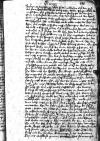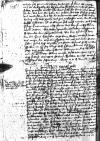Wir haben widderum auf dein und der fraw ⌊Schefekin⌋ bitte superinscribed⌈bittebitte superinscribed⌉, / unser freuntlichen, lieben swegerin bitte superinscribed⌈bittebitte superinscribed⌉ an koninglichenn hof ⌊⌋, / und ferner fleisig bei den vorigen hernn angehalten, / darneben auch das instrument der appellation mit gefertig dahin gefertiget, / also das wir des gewissen vorhoffens adscribed⌈ss adscribed⌉ sein, / ihr widderteil werde alda nichts, das ihr entkegen sein mochte, erhalten noch ausbringenn, / w written over ...⌈... illegible⌈...... illegible⌉ww written over ...⌉oruber wir dem written over n⌈nmm written over n⌉ auch allegereit zuvor auf unser voriges ⌊⌋ / trostliche ⌊⌋ und zusage von den hern ⌊uber⌋ und ⌊undercantzlernn⌋ und doctori ⌊Hosi written over e⌈eii written over e⌉o⌋ bekomen, / wie du aus eingelegtem zedel in gedochter unser swegerin ⌊⌋ wirst zuvornemen haben, / den wir derhalben haben verdeutzschen lassen, / damit ihr in desto bass vorsthen muget, / und solchs heimlich halten. Der fraw ⌊swegerin⌋ haben wir sunst von einem vortrage geschriben, / den der ⌊her⌋ von ⌊Colmenshe⌋ und und her ⌊Johan von Werden⌋, / auch seligenn hernn ⌊Georgen⌋ beidte ⌊brudere⌋ bei uns gesucht. / Duncket uns nicht ungeraten sein, das sie densulben anghen. Wirstu derwegen fleisig bei ihr anhalten, / damit solcher umb ange der ursachen willen, die wir ihr angezeigt, / von ihr nicht werde abgeschlagenn. / Mer wi written over e⌈eii written over e⌉rdt der ihr nutze, den schadthaftig sein, / sunderlich dieweil das kegenteil vorwendet, das der hof zur ⌊Ohre⌋ nicht von seligen hern ⌊Georgen⌋ gekauft, / sunder ihr angeerbet sei, / worin wir uns bogerenn zuberichtenn. ⌊Morten Bausen⌋ haben wir auch schreiben superinscribed in place of crossed-out erinnerenn⌈erinnerenn schreiben schreiben superinscribed in place of crossed-out erinnerenn⌉ lassen, / das ehr fleisig acht haben sol, / auf das der ⌊frawen⌋ nichts vorseumet, / ader was schedlichs widder die ausgebrocht werde. / Vorshe(n) uns superinscribed in place of crossed-out mich⌈mich uns uns superinscribed in place of crossed-out mich⌉ ehr dem also wirdt nachkom(m)en. Die donation, so durch ⌊ko(ningliche) m(ajeste)t⌋ confirmiert, / und daruber ein decret und koningliche sententz gangen ist, / darb noch zur zeit keiner ferner bostetigung. / Wirdt von dem widderpart nicht kunnen ange superinscribed in place of crossed-out widder⌈widder ange ange superinscribed in place of crossed-out widder⌉fochten werdenn. / Wo ess von nothen sein wirdt, / sol darin auch nichts an unserm fleis abghen. Die sechs m(arken) habe(n) wir von den Von den sechs marken, / die der junge bei sich gehabt, / haben wir nichts dem boten zur zerung geben, / sunder die widderum unser ⌊swegerin⌋ zu uberantworten bovolenn. / Wir furderen sie ane das gerne, / wollen sie auch nicht so viel uns muglich sein wirdt vorlassenn. Des jungen ⌊Peter Bhemen⌋ sache haben wir noch in kegenwertickeit des ⌊hern⌋ von ⌊Colmenshe⌋ mit dem her grosmechtigen hern ⌊pomerelischen wojwoden⌋ geredt. / Saget, ⌊ehr⌋ habe mit ⌊Peter Bhemen⌋ se ader imands noch seinem ohemen ⌊Georgen Schultzen⌋ nichts zuthunde, / sunder mit dem fremdem erbnamen, / so des vorstorbnenn kufners erbschaft genomen habenn. / Was sie bolanget  AAWO, AB, D. 70, f. 328v (t.p.) wil ehr sich gerne mit ihnen vortragen, / so ferne ehr north auf die erbgelde, / die der fremden erbnamen noch zu heben sollen, geweiset werde. In deiner sache(n) / die brantmaure botreffende / hat mir her ⌊Johan von Werden⌋ / statliche zusage gethan und vorheisthenn, das ehr die undernemen wol / und die anforderung auf dich gantz und gar abschaffen wil, / den du auch deshe deshalben zu bokuemer zeit wirst antreten, / und solcher zusage z erinnerenn, / auch ferner, das dem so nochgekom(m)en werde(n) bittenn. Gotlichen genaden bovolen. Dat(um) a(us) u(nserm) s(chloss) ⌊Vormdit⌋, den XXVII Novemb(ris). Von den written over m⌈mnn written over m⌉ pferden, die superinscribed in place of crossed-out so⌈so die die superinscribed in place of crossed-out so⌉ wir von der fraw ⌊Schefekin⌋ bohaltenn haben, / wollet umb uns wegen der bozalung, grunt[1] wie wir uns darin halten sollen, gruntlich borinchte(n). / Wir haben dismol gelt wollen schicken, wo ess der junge hette fhuren kunnen. Czu dem zeigt uns unser ohem ⌊Johannes Leheman⌋ an, / das du die zeit superinscribed⌈die zeitdie zeit superinscribed⌉ uns, wen du die zeit superinscribed⌈die zeitdie zeit superinscribed⌉ herruber kom(m)en werest, / deshalben gern eigentlich soltest borichtet habenn. / Solchen boricht wollest in zu superinscribed in place of crossed-out , superinscribed in place of crossed-out doch and then crossed-out⌈doch in zu noch in zu superinscribed in place of crossed-out , superinscribed in place of crossed-out doch and then crossed-out⌉ von dir schreibenn.
AAWO, AB, D. 70, f. 328v (t.p.) wil ehr sich gerne mit ihnen vortragen, / so ferne ehr north auf die erbgelde, / die der fremden erbnamen noch zu heben sollen, geweiset werde. In deiner sache(n) / die brantmaure botreffende / hat mir her ⌊Johan von Werden⌋ / statliche zusage gethan und vorheisthenn, das ehr die undernemen wol / und die anforderung auf dich gantz und gar abschaffen wil, / den du auch deshe deshalben zu bokuemer zeit wirst antreten, / und solcher zusage z erinnerenn, / auch ferner, das dem so nochgekom(m)en werde(n) bittenn. Gotlichen genaden bovolen. Dat(um) a(us) u(nserm) s(chloss) ⌊Vormdit⌋, den XXVII Novemb(ris). Von den written over m⌈mnn written over m⌉ pferden, die superinscribed in place of crossed-out so⌈so die die superinscribed in place of crossed-out so⌉ wir von der fraw ⌊Schefekin⌋ bohaltenn haben, / wollet umb uns wegen der bozalung, grunt[1] wie wir uns darin halten sollen, gruntlich borinchte(n). / Wir haben dismol gelt wollen schicken, wo ess der junge hette fhuren kunnen. Czu dem zeigt uns unser ohem ⌊Johannes Leheman⌋ an, / das du die zeit superinscribed⌈die zeitdie zeit superinscribed⌉ uns, wen du die zeit superinscribed⌈die zeitdie zeit superinscribed⌉ herruber kom(m)en werest, / deshalben gern eigentlich soltest borichtet habenn. / Solchen boricht wollest in zu superinscribed in place of crossed-out , superinscribed in place of crossed-out doch and then crossed-out⌈doch in zu noch in zu superinscribed in place of crossed-out , superinscribed in place of crossed-out doch and then crossed-out⌉ von dir schreibenn.
 AAWO, AB, D. 70, f. 328v (t.p.) wil ehr sich gerne mit ihnen vortragen, / so ferne ehr north auf die erbgelde, / die der fremden erbnamen noch zu heben sollen, geweiset werde. In deiner sache(n) / die brantmaure botreffende / hat mir her
AAWO, AB, D. 70, f. 328v (t.p.) wil ehr sich gerne mit ihnen vortragen, / so ferne ehr north auf die erbgelde, / die der fremden erbnamen noch zu heben sollen, geweiset werde. In deiner sache(n) / die brantmaure botreffende / hat mir her 
